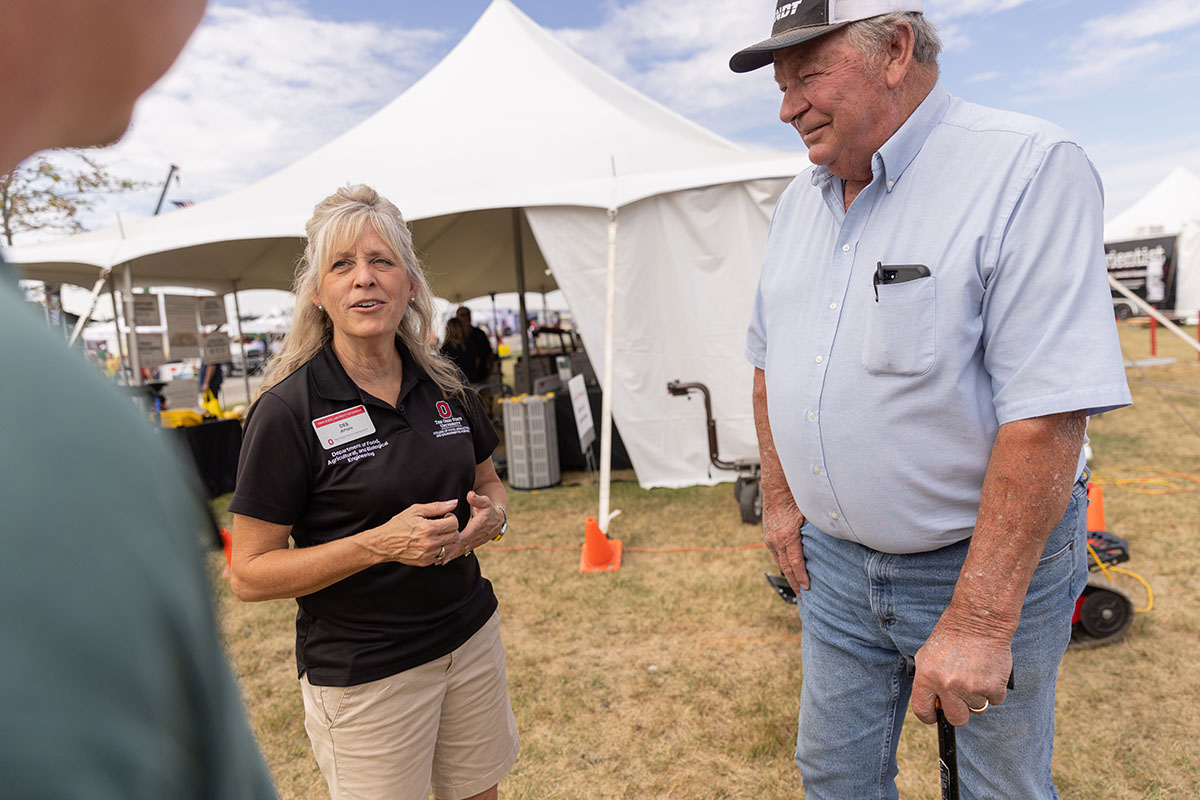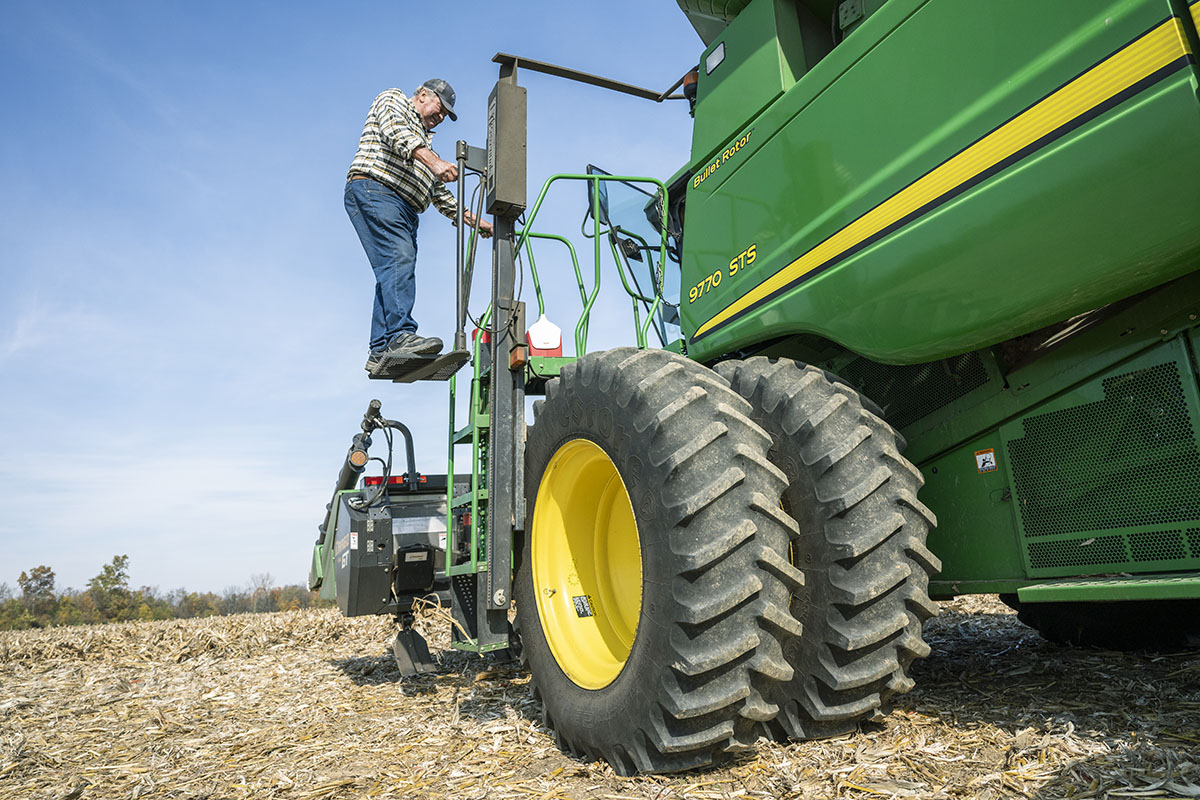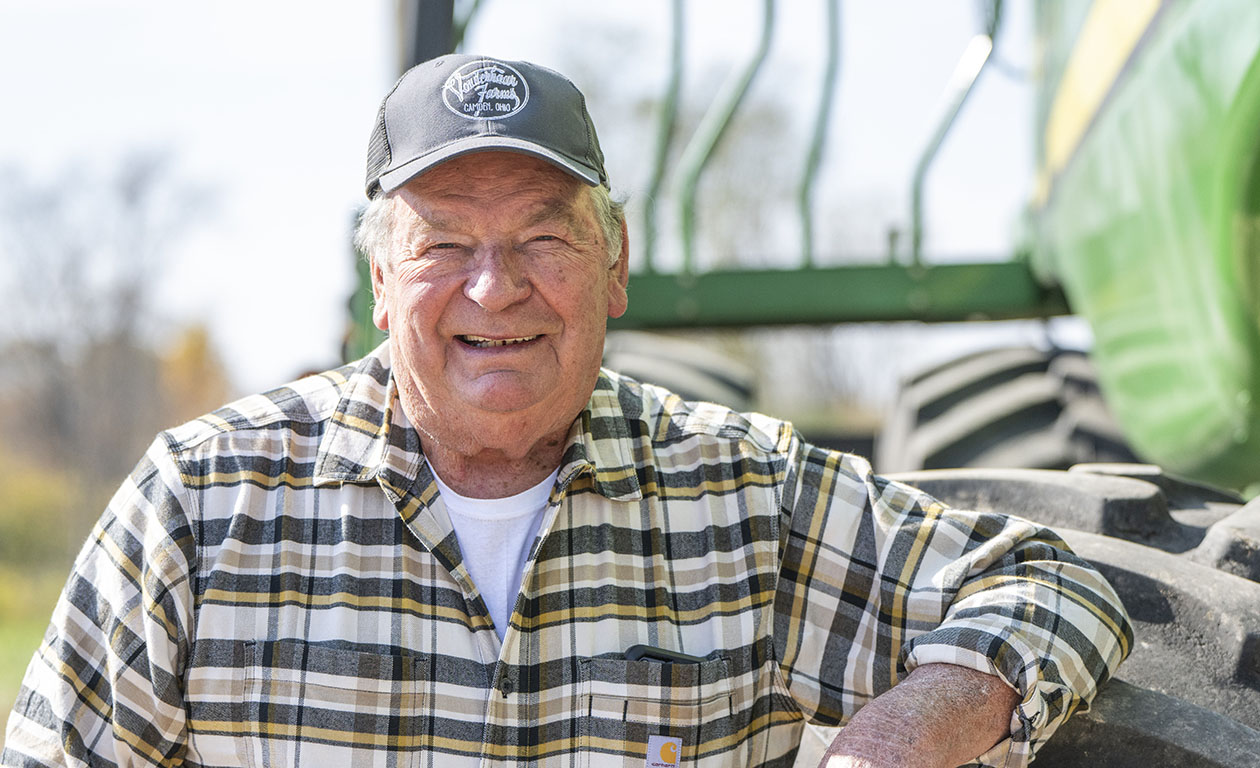Keeping Ohio’s experts in their fields
Ohio AgrAbility program providing resources and training to aid the state’s farmers
A love of farming shines in Len Vonderhaar’s eyes as he gazes at the vast fields of corn and soybeans that he has owned in Preble County, Ohio, since 1961.
“It is such a reward to be out there,” he says.
Vonderhaar still works his family’s farm at age 87 despite three back surgeries and chronic pain in leg joints. He drives a combine harvester across 2,700 acres, for as much as 14 hours a day, to complement the agricultural duties done by his son and two grandchildren.
“It’s not like we’re trying to find work for him,” said grandson Adam Vonderhaar. “We need him to do this, and he loves being needed and being part of the farm.”
The Vonderhaars credit The Ohio State University and its Ohio AgrAbility program for keeping the family patriarch where he wants to be — working in the fields — by arranging to add a platform lift to the family’s combine to help Len overcome physical challenges.
“Oh my gosh, I can’t say enough good things about the program because it prolonged my life,” Len said. “Because of Ohio AgrAbility, I can get out there and work and do what I do. It has just been a godsend.”
Ohio AgrAbility is a partnership program led by Ohio State to assist farm families coping with disabilities or long-term health conditions. More than 5,000 Ohioans engaged in its outreach and services — including 156 helped by communications, on-farm assessments and referrals — in 2024.
“We’re the connecting link to help farmers find services or assistive technology to keep them employed in the job that they want to do,” said Ohio State professor Dee Jepsen, project director of Ohio AgrAbility and the university’s state agricultural safety and health leader.
“If we can’t help them do what they want, we try to get them to a place where it’s a happy medium. We want to give them hope and break down their barriers.”
Len Vonderhaar’s impediment was his chronically ailing back and legs from six decades of hard work. He feared how not being able to contribute on the family’s farm near Camden, Ohio, might affect the family’s corn and soybean business.
“I thought, if I’m not able, what would we do?” he recalled.

Helping the resilient
Hardship is at the center of an agricultural life, considered one of the the nation’s most dangerous occupations in part because of its physical demands.
Still, farmers traditionally move forward no matter what stands in their way.
“They’re very resilient individuals,” Jepsen said. “They can handle a lot of stress, a lot of weather acclimations. They are so used to burdens.”
Six decades of farming formed Vonderhaar’s mindset to figure out a way to overcome his struggles to climb the steep seven feet of narrow steps necessary to get into the combine’s control cabin.
His family originally considered creating an apparatus to help, but they scrapped that idea because of safety concerns. “We were definitely sweating what to do,” Adam said.
That was a moment faced by many working in agriculture.
Ohio State says one out of 14 Ohio farm families experiences a farm-related injury each year. Those include repetitive motion injuries, head or spinal cord injuries, and amputations caused by accidents.
Ohio AgrAbility exists to help when such injuries limit farmers’ abilities to perform essential tasks. Along with making assistive technology available, the program also provides education and resources, as well as access to mental health services.
Any Ohioan who works in agriculture and has a limitation or disability is eligible to benefit from Ohio AgrAbility, one of 21 state and regional projects funded by a grant from the U.S. Department of Agriculture.
“Probably 75 percent of our clients have arthritis or some chronic condition like that which has come through a lifetime of hard work.”
“One of the stigmas we’ve had to break down over the years is that farmers don’t want handouts,” Jepsen said.
This misconception about Ohio AgrAbility has been combated by the personal approach of the staff once a farmer contacts the program or is referred by another party.
“They know what they can’t do. We ask them: ‘What can you do and how can we help you maximize that?’ ” said Laura Akgerman, disability services coordinator for Ohio AgrAbility and Ohio State University Extension.
Ohio AgrAbility provides free on-site assessments for farmers to help determine what equipment modifications, alternative options, or assistive technology — such as platform lifts and motorized chairs — might enable them to continue to work.
Although Ohio AgrAbility isn’t permitted to purchase equipment or provide farmers with financial support, the program partners with Easterseals Redwood, a nonprofit in Cincinnati that helps families assess options for what is affordable for them to make improvements.
Ohio State alumna Rachel Jarman does that work as rural rehabilitation coordinator for Easterseals Redwood, and she then connects farmers in need with agencies such as Opportunities for Ohioans with Disabilities.
“It’s comforting to the farmers that I work and own a farm,” said Jarman, a farmer from Washington Court House, Ohio. “I’ll mention that and then you see them take a deep breath like, ‘OK, she does know what she’s talking about. We’re in the same club.’ ”
Ohio AgrAbility assists those with major injuries such as paralysis, but also helps address limitations from decreased vision or hearing, or illnesses or health problems such as heart disease.
“Probably 75 percent of our clients have arthritis or some chronic condition like that which has come through a lifetime of hard work,” Akgerman said.
Len Vonderhaar is an example. Farming since 1961 led to painful knees, a back requiring medical attention, and doubt about his future occupation.

A team approach
Vonderhaar’s hope to continue farming began fading in spring 2019, three years after he underwent the first of three back surgeries that left him with 12 screws in his spine and five vertebrae attached by steel bars.
“Once he got into the combine, he was totally able to operate the hand controls,” Adam said. “Up there, he was able to work fine, but getting up there was the big challenge.”
Scrambling for solutions, Adam remembered the Ohio AgrAbility program mentioned by Jepsen when she taught one of his classes at Ohio State, where he earned a bachelor’s degree in agricultural systems management in 2018. Ohio AgrAbility is a program of Ohio State University Extension, the outreach arm of the College of Food, Agricultural, and Environmental Sciences.
Adam contacted Jepsen, who reached out to Easterseals Redwood, which assessed the family’s situation and arranged for a company to provide a customized hydraulic lift platform for their combine.
“The first time he used the lift, he looked over at me and smiled,” Adam said. “It was a really cool moment. I was just so happy for him.”
Ohio AgrAbility also helped Vonderhaar receive an oversized electric scooter for getting around on the farm, as well as a customized workbench — which can be electronically raised or lowered — and an adjustable chair for the barn workshop.
In return, Ohio AgrAbility earned heartfelt advocates for the program in the Vonderhaar family. They often speak to other farmers about shared experiences and explain how the program can help.
“I just think the world of all the [Ohio] AgrAbility team and all that they’ve done for me,” Len said. “It has just been tremendous. We give Ohio State all the credit we can.”
This work is supported by the USDA National Institute of Food and Agriculture.
